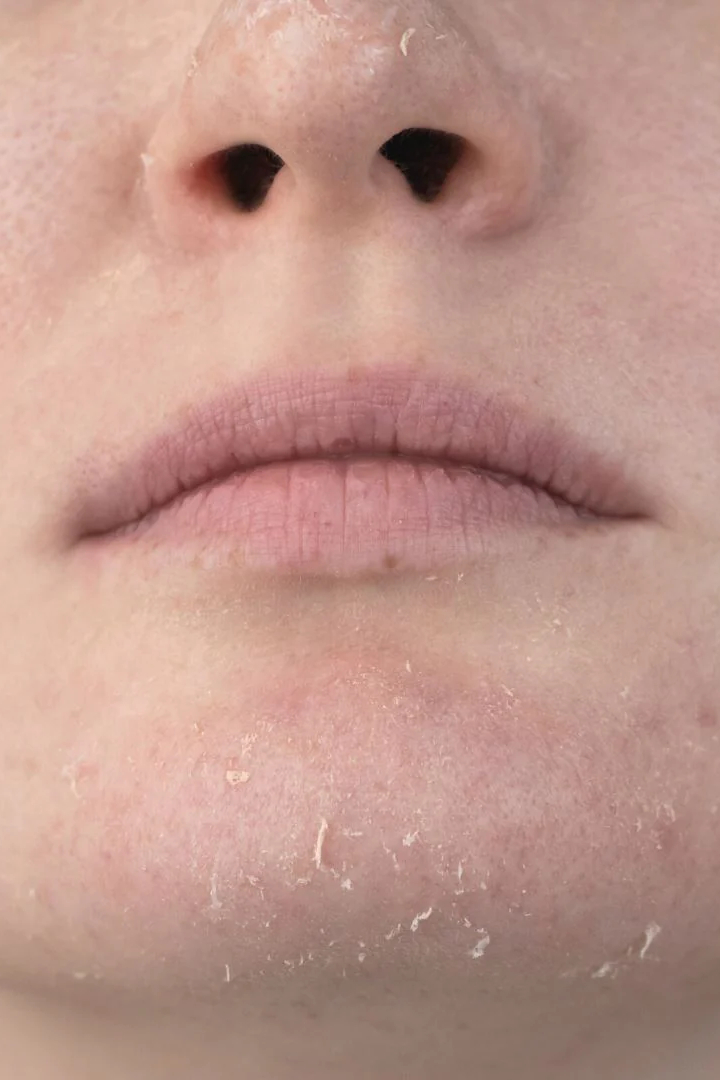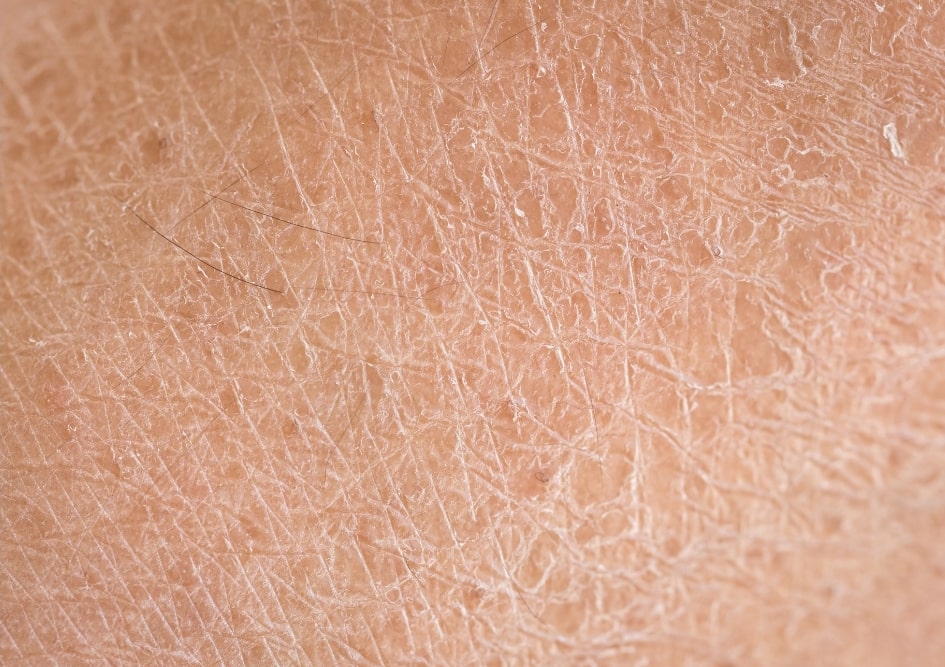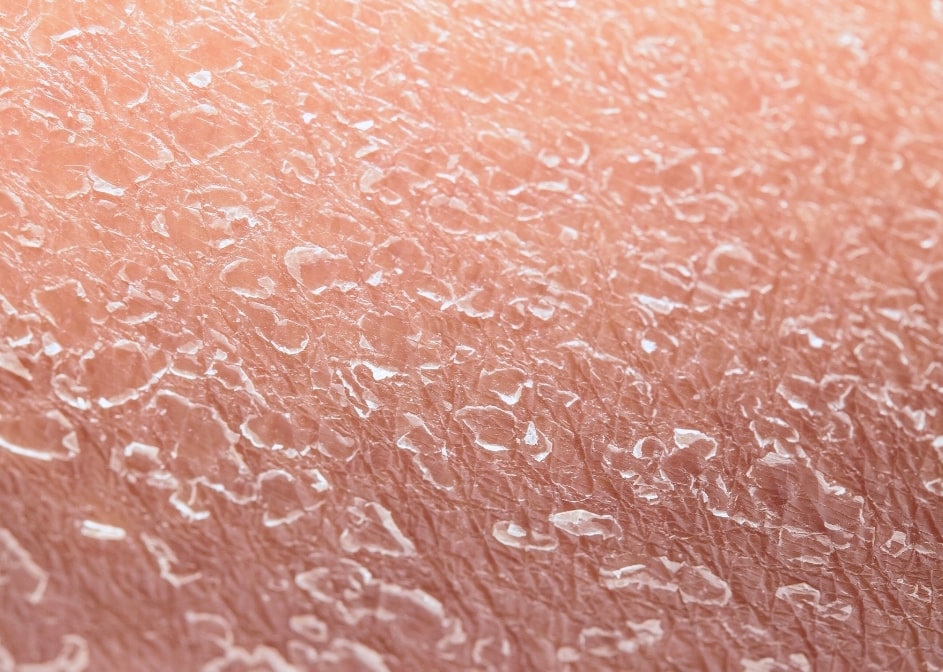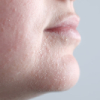
Our Clinic’s Beliefs
What is Skin Dehydration?
Dry skin is also known as “xerosis” and can be either congenital or acquired. It can also be mild and hardly noticeable or very severe to the extent that there are serious complications such as infection. Dehydrated skin is a common skin concern that occurs when the skin lacks moisture and becomes dry and flaky.
Dry skin is characterised by the lack of moisture in the layers of the skin. The skin is a natural barrier between the outside world and our body. There are many cells, structures, bonds, and components which make up this barrier. When there are changes in this barrier due to various causes, water loss increases and leads to drier skin.
Skin dehydration causes can be congenital, inflammatory, environmental, and/or ageing. It is always important to firstly rule out any congenital skin diseases that may be causing dry skin. Inflammatory conditions such as rosacea, psoriasis, dermatitis, and eczema can also cause more dryness of the skin.
Environmental causes of skin dehydration include overuse of hot water, detergents, friction from clothing, pollution, frequent air travel, air conditioning, exposure to other chemicals and even stress.
Causes of Dehydrated Skin
There are several reasons for dehydrated skin, including the following:
- Cold weather
- Sleep deprivation
- A lot of stress
- Alcohol and caffeine consumption
- Smoking
- AC conditions
- Cosmetics with high PH levels
Symptoms & Signs of Skin Dehydration
The symptoms and signs of dehydrated skin can vary depending on the type and severity of the condition. Common dehydrated skin symptoms include:
Skin that feels tight and itchy
Rough texture
Fine lines and wrinkles
Dull and tired-looking skin
Flakiness, Scaling
Cracks, Fissures


Types of Skin Dehydration
A thorough medical history, including current and past illnesses, lifestyle/environmental factors and family history, is important to assess the causes of dry skin. Unfortunately, there is still a lack of consensus on objective measurements of dry skin and applications in healthcare institutions. Therefore, an assessment continues with a visual examination of the skin and various types of medical photography.
(In some cases, additional tests such as a skin biopsy may be necessary to rule out other conditions that can cause similar symptoms so that effective treatment on how to fix dehydrated skin can be recommended. Your dermatologist may also advise you on how to test if skin is dehydrated, so it can be addressed effectively)
Mild skin dehydration
Mild skin dehydration is characterised by dry and flaky skin that may feel tight or itchy.
Severe skin dehydration
Severe skin dehydration can lead to cracked and painful skin that may bleed.
Dehydrated Skin Vs Dry Skin – Understand The Difference
Dehydrated skin is not dry skin. Dry skin lacks sufficient oil, leading to roughness, flakiness, and rough marks. On the other end, dehydrated skin lacks water, resulting in tightness and dullness. Dry skin feels rough, while dehydrated skin appears dull and lacks elasticity, often showing fine lines and wrinkles.
Understanding Dry Skin
Dry skin is one of the five most common skin types, alongside oily, normal, combination, and sensitive skin. Its main feature is that it produces a lot less sebum compared to other skin types, leaving your skin feeling dry and possibly looking flaky. In most cases, genetics plays a crucial role in determining your skin type. Look at your parent’s skin; do they have some skincare concerns? Chances are you might also have a similar skin condition. On the other end, external factors also play a crucial role in the quality and texture of your skin. If you live in a cold or dry climate, take hot and long steamy showers, or are not using proper skincare, you might have dry skin issues.
Moreover, as we age, the likelihood of experiencing dry skin increases, especially as the skin’s sebum production diminishes. You lose 1% of collagen each year after you reach your thirties.
Understanding Dehydrated skin
Dehydrated skin is quite similar to dry skin in terms of its texture, but it has some distinctive features that have led to it becoming dehydrated and dull. Dehydrated skin lacks moisture and appears dull and tight. Not only that, it can also have increased sensitivity and prominent fine lines. For dehydrated skin types, drinking water and staying hydrated is vital in improving your skin’s texture and radiance. Also, you need to protect your skin from external aggressors.
Skin Dehydration Treatment Options
Treatment options for skin dehydration depend on the severity and type of skin dehydration, as well as the patient’s skin type and medical history. Common treatment options include:
- Lifestyle Modification
- Environmental aggravation avoidance
- Topical cosmeceuticals: Using products that contain hyaluronic acid, glycerin, or other hydrating ingredients can help to restore moisture to the skin. Using a daily serum and moisturiser can help to hydrate the skin and prevent future dehydration.
- Avoiding harsh skincare products: Avoiding products that contain alcohol, fragrances, or other harsh ingredients can help prevent further dehydration. Ingredients such as salicylic acid, glycolic acid, or other exfoliants can cause skin dryness.
- Treatment of any underlying congenital or inflammatory illness
- Drinking water

Skin Dehydration Treatment
Sonophoresis
This device assists in opening the barriers in the skin to allow applied topicals to absorb more efficiently into the skin.
Microdermabrasion
A device is used with a motorised abrasive surface to assist in removing dead skin cells on the surface, which can hinder moisture and topical cosmeceuticals from absorbing into the skin. However, if the treatment is too frequent or intensive, it can cause more skin irritation and dryness.
Hydro Microdermabrasion
These treatments utilise suction instead of abrasion to remove the dead skin cells, causing less irritation to the skin. Also, simultaneous perfusion of various serums for combating skin dehydration helps to hydrate the skin, enhancing skin appearance.
Local injections
“Skin boosters” (polynucleotides, hyaluronic acid for skin hydration), when injected into the skin layers, bind to water molecules, enhancing hydration at a deeper level than just topical treatments. Injections require topical anaesthesia due to pain from the injection and entail some type of “downtime” where the skin will have “bumps”, redness and/or swelling for a few days after the treatment.
Find the Right Doctor For Skin Dehydration Treatment in Singapore
Finding the right doctor for skin dehydration is crucial for an effective treatment and long-term skin health. At AEON Medical, our medical aesthetic doctor, Dr Jeslin is dedicated to providing personalised treatment based on your unique skin needs.
By customising treatment plans based on individual needs and using the right technologies, we can effectively improve skin hydration and maintain a better skin condition.
Ready to address dehydrated skin issues? Book an appointment with us today!

Disclaimer
The information provided on this website is for educational purposes only and is, in no way, intended to be a substitute for professional medical advice, diagnosis, or treatment. We make no representation or warranty of any kind regarding the accuracy, availability, adequacy, or validity of the information or procedures outlined on the website. Always consult professional medical and aesthetic advice for your skincare and medical concerns.
References:
- Linda J. Vorvick, MD, Clinical Professor, Department of Family Medicine, UW Medicine, School of Medicine, University of Washington, Seattle, WA, National Library of Medicine, 2024, https://medlineplus.gov/ency/article/003281.htm
- Sylvie Verdier-Sévrain, Frédéric Bonté, "Skin hydration: a review on its molecular mechanisms", 2007, National Library of Medicine, National Center for Biotechnology Information, https://pubmed.ncbi.nlm.nih.gov/17524122/
Contact Us
Talk to our friendly AEON team by filling out the form. We will get back to you within 2-3 working days. For a faster response, contact our hotline below.
Call us anytime
Address
9 Scotts Rd, #06-01/02/03 Scotts Medical Centre, Pacific Plaza Singapore 228210


